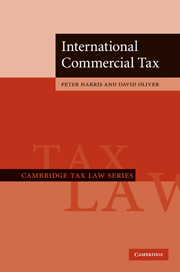Book contents
- Frontmatter
- Contents
- Preface
- List of abbreviations
- Table of Cases
- Table of statutes
- Table of treaties
- Introduction
- 1 Fundamentals and sources of international tax law
- 2 The jurisdiction to tax
- 3 Source country taxation
- 4 Residence country taxation
- 5 The limited scope of treaties
- 6 Changes of source and residence
- 7 Bilateral administrative issues
- Conclusion
- References
- Index
1 - Fundamentals and sources of international tax law
Published online by Cambridge University Press: 03 May 2011
- Frontmatter
- Contents
- Preface
- List of abbreviations
- Table of Cases
- Table of statutes
- Table of treaties
- Introduction
- 1 Fundamentals and sources of international tax law
- 2 The jurisdiction to tax
- 3 Source country taxation
- 4 Residence country taxation
- 5 The limited scope of treaties
- 6 Changes of source and residence
- 7 Bilateral administrative issues
- Conclusion
- References
- Index
Summary
The purpose of this chapter is to outline background material that is important in later discussions. It is structured under three headings. The first considers some tax fundamentals that identify the nature of income tax and its basic attributes. As mentioned in the introduction, the purpose of this heading is to identify a number of income tax fundamentals that are important when projected into an international setting. The second heading proceeds to identify the sources of law that will be referred to and analysed in the remainder of this book. The focus is primarily on three sources of law – domestic law, tax treaties and EU Law – although residually a number of others are mentioned. The heading considers how these sources take effect in domestic law and how they interact with each other. The last heading considers the approach to interpretation of the sources by relevant courts. Here the focus is on the approach to interpreting treaties, which may be substantially different from that used for interpretation of domestic legislation. Also of particular importance is the jurisprudence of the European Court of Justice, the central court appointed to interpret EU Law.
Tax fundamentals
A responsible government is one that is elected to represent its community members. It is a basic premise of the relationship between community members that they will share the burden of funding their common government. Taxes are the way in which those community members are, at least initially, obliged to share that burden.
- Type
- Chapter
- Information
- International Commercial Tax , pp. 8 - 42Publisher: Cambridge University PressPrint publication year: 2010

